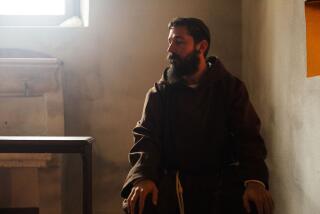‘Rear Window’ with teenagers
- Share via
The teen thriller “Disturbia,” in which a housebound voyeur stumbles upon a possible murderer across the way, is basically an uncredited remake of the 1954 Alfred Hitchcock classic “Rear Window” (which was in turn based on a 1942 Cornell Woolrich story). What the new movie lacks in craft, suspense and metaphoric richness it makes up for with, um, gadgets.
“Disturbia” is “Rear Window” as retrofitted by Circuit City. The snooping hero starts out with binoculars, but his techniques soon involve a tripod-mounted surveillance camcorder and a fuzzy live feed via cellphone camera.
Directed by D.J. Caruso, who has yet to deliver on the promise of his noirish 2002 debut, “The Salton Sea,” “Disturbia” opens with a horrific collision that kills the young protagonist’s father. One year later, Kale Brecht (Shia LaBeouf), a sullen, resentful teen, punches out an obnoxious teacher who tauntingly brings up his dead dad and is placed under house arrest for the entire summer.
Fed up with his layabout ways, Kale’s mom (Carrie-Anne Moss) shuts off the Xbox and iTunes and even snips the TV cable, leaving the resourceful teenager to take up an old-fashioned form of reality entertainment -- looking out his bedroom windows. Good thing the Brechts -- named in acknowledgment of their stage-like surroundings? -- live in a suburban development that seems to have been designed for minimum privacy and is furthermore populated by exhibitionists with an aversion to window treatments.
Kale familiarizes himself with the nightly yoga regimen of Ashley (Sarah Roemer), the young beauty who has just moved in next door. Before long she’s a frequent visitor, painting little red hearts on his electronic anklet. Joined by Kale’s goofball friend and comic-relief third wheel, Ronnie (Aaron Yoo), the kids shift their attention to another neighbor, the quietly menacing Mr. Turner (David Morse), whose car matches that of a suspected serial killer and who one night is seen lugging what looks like a bloody body bag into his garage.
The is-he-or-isn’t-he flip-flops that constitute this film’s idea of ambiguity generate more tedium than tension. The only surprise is in the nastiness of the climactic revelations, which by that point simply seem desperate. LaBeouf, particularly impressive in last year’s indie “A Guide to Recognizing Your Saints,” is a likable, versatile young everyman, but this underwritten role isn’t exactly a performer’s showcase. Morse, a reliably thoughtful character actor, does most of the heavy lifting, but no amount of icy opacity can neutralize the obviousness of the script.
“Rear Window,” which the filmmakers name-drop in the press notes along with such voyeur-cinema touchstones as “Peeping Tom” and “Blow-Up,” remains one of the most eloquent films ever made on the pleasure and perils of viewership. Jimmy Stewart’s rapt, immobilized hero is the ultimate surrogate figure for a movie audience.
It’s to the credit of “Disturbia” that LaBeouf’s Kale has the truncated attention span of a 21st century culture consumer. But the film has nowhere near the conceptual sophistication of “Rear Window,” where the protagonist’s absorption in what he’s watching mirrors the viewer’s. The problem with “Disturbia” is that for most of the film you’ll wish you weren’t watching at all.
“Disturbia.” MPAA rating: PG-13 for sequences of terror and violence and some sensuality. Running time: 1 hour, 44 minutes. In general release.
More to Read
Only good movies
Get the Indie Focus newsletter, Mark Olsen's weekly guide to the world of cinema.
You may occasionally receive promotional content from the Los Angeles Times.






